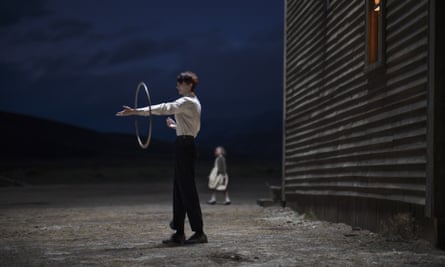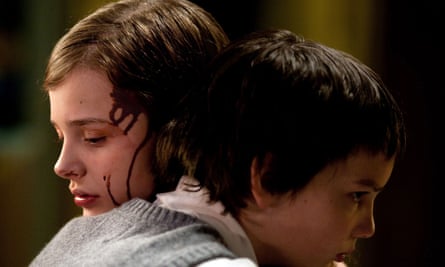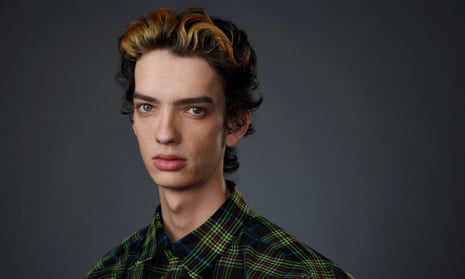Jane Campion’s psycho-sexual western The Power of the Dog is a tremendous film but it is the power of Kodi Smit-McPhee that really adds bite to its bark. The 25-year-old Australian actor has been a fragile, hypnotic presence, with an eerie knack for stillness and intensity, ever since his earliest performances. At the age of 10, he played a boy coping with the desertion of one parent and the breakdown of the other in Romulus, My Father. At 12, he trudged through a post-apocalyptic hell-scape in The Road, then fell in love with a vampire at 13 in Let Me In, the US remake of the Swedish horror hit Let the Right One In. Even his multiplex movies, such as the X-Men outings (Apocalypse and Dark Phoenix) in which he played the blue-skinned Nightcrawler, have felt that bit stranger thanks to his delicate, androgynous features and those pool-sized anime eyes set far apart on his face.
His uncanny quality is crucial to Campion’s movie, which is set in early 2oth-century Montana. Smit-McPhee plays the gangly, effeminate Peter, who spends his days crafting intricate paper flowers and sketching dead animals. His life is destabilised when his mother (Kirsten Dunst), a widowed innkeeper, takes up with a new partner. It is not this stepfather (Jesse Plemons) who poses a threat so much as his sadistic, bullying brother Phil (Benedict Cumberbatch), who taunts Peter and mocks the way he “creeps all over the place, big eyes goggling”.

For our video call, the actor is seated in front of an image of the mountain landscape that dominates the film, although his outfit today is more fop than cowboy: a cream roll neck under a beige leather jerkin festooned with flaps and pockets. His answers arrive in a sombre monotone; he sits static and upright, hands folded in his lap. Were his lips not moving, it might seem as if the screen had frozen. Perhaps his posture is a necessary response to the painful inflammatory condition from which he suffers: ankylosing spondylitis. “Shall I just let you try and say it?” he teases after I mangle the pronunciation. Then he changes tack sweetly: “You can just call it AS.”
Smit-McPhee was a proponent of the still-waters-run-deep school of acting long before his AS diagnosis at 16. His single-minded concentration is part of what results in such transfixing performances. A case in point is the most glorious scene in The Power of the Dog: Peter’s bouncy, lolloping walk from one end of the haymaking camp to the other, past rows of macho cowboys who are wolf-whistling and cat-calling and hollering homophobic abuse, none of which does anything to arrest his progress or dim his defiance. This apparently undramatic stroll, which occurs roughly halfway through the film, changes the course of the entire story.
“I love that,” he says. “I call it the catwalk scene. It shows Peter’s unwavering spirit in the face of all that judgment. He is in an isolated environment so he’s never had to repress anything in front of anyone. Phil hasn’t had that freedom, so he has solidified into this very toxic personality.” I ask how it felt emotionally to perform that walk, but he shoots me down. “I can only tell you how Peter felt. There’s no narrative there of what Kodi’s feeling. If there was, I wouldn’t be in the moment.” Fair enough.
Cumberbatch was the one cast member who stayed in character between takes, although that had a trickle-down effect on everyone else. “Phil is so hostile that just being in his presence, we all felt it,” says Smit-McPhee. “That’s the idea behind Benedict going method. He’s an apologetic sweetheart Englishman, and we couldn’t have that guy anywhere near the set. We needed Phil there.” When did he get to meet the real Cumberbatch? “Oh, there were a few times when he would surface with a giggle, then snap back. Also, it was Benedict who was there during the two weeks of rehearsals, as was Kodi.”
Smit-McPhee’s use of the third person stops seeming odd eventually, just as you also become accustomed to him referring to himself as an “artist” or mentioning several times his interest in “philosophy, science, quantum physics” and “esoteric hidden knowledge like mythology and alchemy and all that fancy stuff”. On screen, he can come across as ageless or spookily wise: a thin, pale sage. The best in the business have had to raise their game in his presence. Not just Cumberbatch but Eric Bana (in Romulus, My Father), Viggo Mortensen (The Road), Michael Fassbender (Slow West). So it is nice to be reminded in conversation – when he refers to “all the achievements I have under my belt” or “the inspiration I take as an artist from the primordial soup of stories that predate us”– that he is, after all, only 25.

“I find parallels between Peter and myself,” he says. “We don’t necessarily fit in the generalised boxes of society, and there are sides to him that I need to reinforce in my own life; his power and his confidence in who he is. He’s not living up to the expectations of what masculinity and strength are to other people.” Some of the pressure that Smit-McPhee has felt about his own masculinity came from looking at his father, the wrestler-turned-actor Andy McPhee, who got him into the industry in the first place. His dad already had a career in Australian television when he encouraged him and his sister to try acting. Once Smit-McPhee’s career began to take off spectacularly, the family decamped to the US.
“My dad has always been my coach and my mentor,” he says. “We are so close. But he’s 6ft 6in, he’s got a goatee, he has ridden with outlaw motorcycle clubs most of his life. As I started to approach adolescence, I wondered when I was going to bloom into this masculine thing. Do I have to go to the gym? Do I have to speak a different way? One day there was a bit of a breakthrough and I realised I don’t have to be any of that. I’m an ectomorph. I’m interested in philosophy. I’m an artist, and that’s beautiful. Peter helped me discover that it’s OK not to fit into that masculine box. You can still be strong, no matter how you look and carry yourself.”
Has he confronted his father about this? “Yeah. One day we got into a father-son thing, clashing heads a bit, and it just happened that I ended up saying I wasn’t going to be like him. He said he never wanted that; he just wanted me to have street smarts and to protect myself. He broke down a bit and said: ‘You’re my boy, you’re perfect, you don’t have to be anything that I am.’ It was a beautiful transition point for both of us.”
There has been another change in his life recently, one which comes up when I ask about the “777” tattoo on his hand. “It’s an angelic number,” he says. “It represents God for many but for me it was to mark a point of transition in my life. I can’t say what because it’s so personal to me but I think everyone can relate to it. You get to that point in your life where you realise you’ve become stagnant. You just need to grow and change, and then you cut off certain people.”
Whoa. That sounds brutal. Are we talking about something traumatic? “Not really, it’s just what tends to happen in LA or any big city I guess. I was around many of the same people who maybe seven years ago were necessary to my life, and yet now you find it’s a very surface-level relationship. I’m someone who needs to keep evolving in my craft, my personal life, my health, and I found those people weren’t doing that for me. It’s not to blame them or whatever journey they are on. It’s just about cutting ties in a healthy way.”
Anyone who sees The Power of the Dog will recognise this as very Peter-like behaviour. Whomever it was that Kodi Smit-McPhee expunged from his life can at least console themselves that the event was momentous enough to be marked with a commemorative tattoo. No one could accuse him of taking it lightly. Taking things lightly just isn’t his style.

Comments (…)
Sign in or create your Guardian account to join the discussion